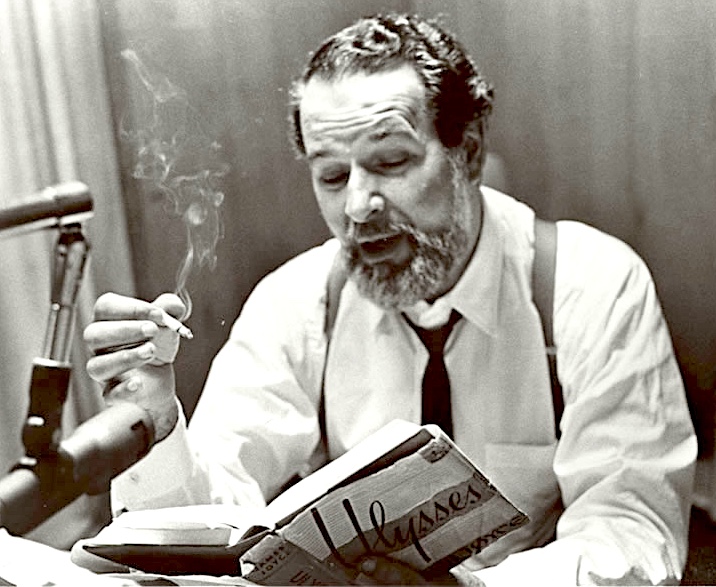Joyce Audio – Audiobooks: Ulysses
- At December 24, 2022
- By Great Quail
- In Joyce
 0
0
Joyce Audio: Ulysses
This page profiles professional and commercial recordings of Ulysses. Most links take you Amazon, where you may listen to samples and download the “aax” file for your Audible-enabled device. Other media such as LP, cassette, CD, MP3, and FLAC are listed separately.
Recommendations
For visitors who just want a quick recommendation, my favorite unabridged Ulysses is the Tadhg Hynes & Kayleigh Payne set, followed closely by the Naxos Ulysses. My favorite abridged version is the 2012 BBC Ulysses radio play, but the 1993 BBC Ulysses is definitely worth a listen!
Joyce Audio
[Main Page | His Own Voice | Collections | Dubliners | Portrait | Ulysses | Finnegans Wake | Drama & Poetry | Biography & Criticism | Miscellany]
Ulysses (pp. 136-137)
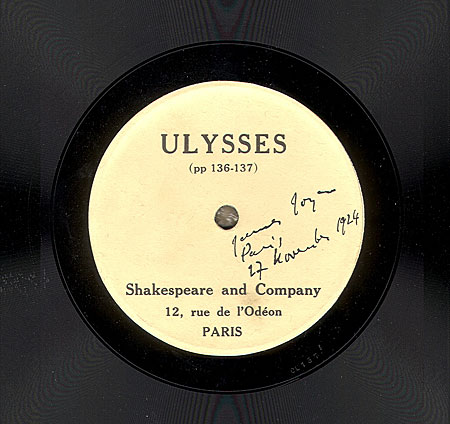
Ulysses (pp. 136-137)
Shakespeare and Company/HMV, 1924
In 1924 James Joyce was recorded reading from the “Aeolus” episode in Ulysses. The complete history of this recording may be found in “James Joyce—In His Own Voice.”
Ulysses: Soliloquies of Molly and Leopold Bloom

Soliloquies of Molly and Leopold Bloom
Read by Siobhán McKenna & E.G. Marshall
Caedmon, 1960
Also available as: Brazen Head MP3 | Internet Archive MP3
Also available on: The James Joyce Audio Collection
Abridged; 47 minutes, 50 seconds.
A brief history of Caedmon Records and their many James Joyce recordings may be found in “Audiobooks: Collections.” This LP was released in 1960, and features two Irish Shakespearean actors working under the direction of Howard O. Sackler. Siobhán McKenna (1922-1983) reads the last few pages of “Penelope.” I’ve heard numerous recitations of Molly’s celebrated soliloquy, but whenever I read Joyce’s original text, it’s McKenna’s voice I hear. Her reading is pitch-perfect: dramatic, bitchy, nostalgic, passionate, and defiant. Her counterpart is the American actor E.G. Marshall (1914-1998), who brings the same level of commitment to Bloom’s “soliloquy”—his rambling thoughts after masturbating in “Nausicaa,” from “Suppose I spoke to her?” to “Because you were so foreign from the others.” One line flows naturally into the next, Marshall’s voice striking all the right notes from bitingly salacious to hopelessly nostalgic.
Ulysses (Five Episodes Directed by Zack Bowen)

Lestrygonians
Directed by Zack Bowen. Read by Richard Alan Hughes, et. al.
Folkways, 1961
Calypso
Directed by Zack Bowen. Read by Richard Alan Hughes, et. al.
Folkways, 1963
Lotus Eaters
Directed by Zack Bowen. Read by Richard Alan Hughes, et. al.
Folkways, 1963
Hades
Directed by Zack Bowen. Read by Richard Alan Hughes, et. al.
Folkways, 1964
Sirens
Directed by Zack Bowen. Read by Richard Alan Hughes, et. al.
Folkways, 1965
Zack Bowen (1935-2010) was a larger-than-life Joyce scholar with a raucous sense of humor and a passion for music. He served as the president of New York’s James Joyce Society as well as the International James Joyce Foundation. During his tenure with the JJS, he organized “dramatic readings” of Ulysses using students and faculty from the State University of Education at Fredonia, New York. Funded by the University’s Research Foundation, the performances were recorded and released by Folkways Records. According to the original advertising, each album “presents a chapter in its entirety, as accurately as possible, for the benefit of students of Joyce as well as those who merely seek entertainment. Every effort has been made to present not only the thoughts and activities of Leopold Bloom, but also the music which he hears and thinks about as it occurs in the text.” The musicians include Zack Bowen’s own tenor voice.
As far as I know, none of these recordings have been digitized, and the records themselves are extremely rare. Paul Fresh mentions the series in his 1983 New York Times article, “James Joyce: The Music of His Words on Disk.”
The conscientious reader trying to get the hang of Ulysses should find particularly helpful a series of recordings made for Folkways by Zack Bowen, president of the James Joyce Society, a musician and professor of drama who has taken the texts of major chapters from the novel and directed students and faculty members of the State University of Education at Fredonia, N.Y., in dramatic readings which blend their inner, “stream-of-consciousness” thoughts with the characters’ speaking voices and actual songs of the period to which Joyce keeps alluding, all orchestrated into a kind of palimpsest of sound. Completed albums cover such celebrated sections of the book as ‘“The Lotus Eaters” (FL 9836), “The Lestrygonians” (two disks, FL 9562), “Hades” (FL 9814) and “Calypso” (FL 9835). The direction and production values are admirable, but the acting is so disappointingly amateurish I kept wishing the resourceful Professor Bowen could do the whole thing over with professional help. Indeed, he has been able to accomplish far more in the most recent album in the series, “Sirens” (two disks, FL 9563) with its wonderful overture in words and multiplicity of musical allusions, for this time he has been able to work with a topnotch cast, headed by Martin J. Kelley, Ray Allen, Paddy Croft, Norman Isaacson and Marian Seldes. Here the musical elements so conspicuous in Joyce’s structure cannot only be perceived but unreservedly relished, as Odysseus-Bloom resolutely resists the allure of those barmaid temptresses, the blonde Mina Kennedy and the sun-bronzed Lydia Douce, by resolutely assuring himself that the music he overhears from the bar of the Ormond Restaurant is nothing but arithmetic—“Numbers it is. All music when you come to think. Two multiplied by two divided by half is twice one. Vibrations: chords those are. One plus two plus six is seven. Do anything you like with figures juggling… Musemathematics. And you think you’re listening to the ethereal…”
I have never heard these recordings. If any visitor has any additional information, please contact the Brazen Head!
Ulysses (1967 Strick Soundtrack)
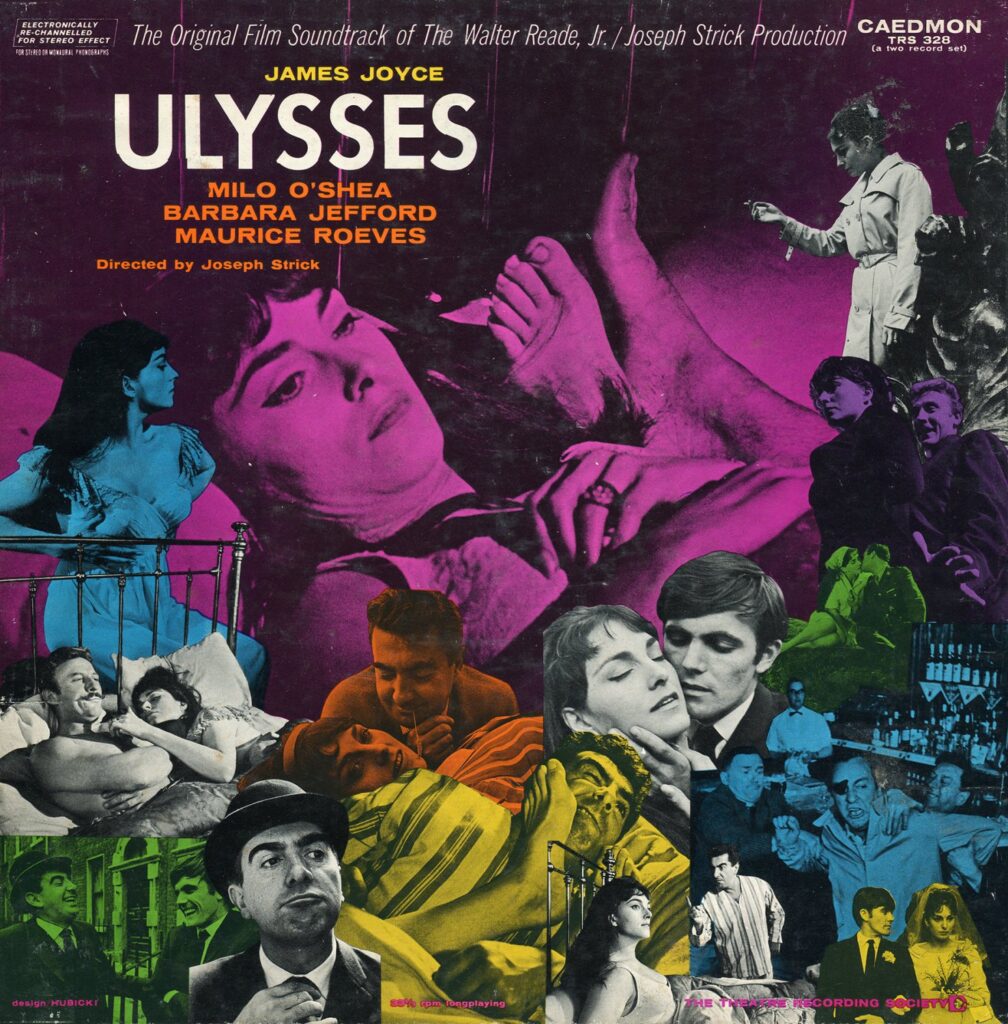
Ulysses (1967 Strick Soundtrack)
Read by Milo O’Shea, Barbara Jefford & Maurice Reeves
Caedmon, 1968
Also available as: Cassette | LP | CD | YouTube | Internet Archive FLAC
Abridged; 1 hour, 39 minutes
This “soundtrack” is literally just that—the entire 1967 Joseph Strick film of Ulysses pressed to a 2-record set. It’s widely available on the Web, with a PDF of the extensive liner notes available to download at the Internet Archive.
Contents:
Disc One
1. The Tower
2. Poldy
3. The School
4. Throwaway
5. The Strand
6. The Newspaper
7. Josie Breen
8. The Tavern
9. The Hospital
10. Bloom In Nighttown (Beginning)
Disc Two
1. Bloom In Nighttown (Conclusion)
2. Molly Bloom’s Soliloquy
Ulysses
Read by Alexander Scourby
American Foundation for the Blind, 1967
22 LPs; 36 “Talking Book” discs
Listen on YouTube: [Part 1] [Part 2] [Part 3] [Part 4] [Part 5] [Part 6] [Part 7] [Part 8]
Unabridged; Unknown length.
This early recording of Ulysses has its genesis in a little-known Congressional act. According to the National Federation of the Blind:
In 1931 Congress passed the Pratt-Smoot Act, which authorized the distribution of books to blind and physically handicapped people in the United States through what is now known as the National Library Service for the Blind and Physically Handicapped of the Library of Congress (NLS). “Talking Books” began to be produced in 1934 and were originally recorded on phonograph records; cassette books were produced beginning in 1971. Today recorded books and the equipment to play them are distributed through a network of cooperating libraries throughout the country. Books on all subjects and representing all literary genres, as well as a selection of popular magazines, are available to NLS patrons.
One of the biggest producers of “talking books” was the American Foundation for the Blind, who hired professional actors to record unabridged readings. For Ulysses there only seemed one choice—the American Shakespearean actor Alexander Scourby, who had become famous for his reading of the King James Bible, an endeavor that occupied four years of his life and filled 160 LPs! As Matthew Rubery writes in his essay, “Ulysses, Blindness, and Accessible Modernism”:
If the Bible remains Scourby’s longest recording, Ulysses proved to be the most difficult. Scourby recalled, “Here is a book that I thought I had read when I was 20. But I had only skimmed it. When I read it aloud I really had to know what Joyce was saying. The unfortunate part is that no one can tell you what all of it means. I went through Ulysses with four volumes of help.” Begun on Bloomsday for good luck, the recording took him two and a half months to finish.
Possessing a calm but authoritative “fireside radio” voice, Scourby reads Ulysses in a wonderfully transparent and direct manner. While he makes little attempt to vary his delivery between the internal monologues of Stephen, Bloom, and Molly, he does invest the cast with warmth and humor, and his Dubliners are a lively bunch animated by small quirks and genuine laughter—the whole “U.P. up” sequence has rarely sounded funnier!
Although Scourby’s Ulysses has been superseded by modern recordings with better production, more knowledgeable readers, or authentic Irish voices, it remains an amazing achievement, and one worth hearing. Unfortunately it remains difficult to obtain. In the early ‘naughts, NLS “talking books” were transferred from mono cassettes to flash-based digital cartridges. These cartridges require a special player to access, and both player and cartridges are restricted to disabled citizens, who must request them from the Library of Congress. While the system is especially designed for braille readers, there are legal reasons for these limitations as well: NLS recordings are granted a special dispensation from copyright law. According to the U.S. Government Accountability Office:
Under U.S. copyright law, NLS is authorized to reproduce and distribute talking books without copyright infringement as long as they are produced in a specialized format exclusively for use by blind or other persons with disabilities. The standard describing the specialized format for digital talking books is maintained by the Digital Audio-Based Information System (DAISY) consortium—an international organization established to develop specifications and tools for digital talking books—and accordingly is commonly known as the Daisy standard.
This legal restriction, coupled with the lamentable lag in technology so common to government agencies, has created a situation where Scourby’s reading remains regrettably obscure. As of this writing, there’s only one source outside the Library of Congress, and that’s the “Scourby YouBible Channel,” a Christian YouTube channel devoted to circulating Scourby’s magisterial readings of the King James Bible. Scattered among these Biblical videos are excerpts of secular readings such as War and Peace and Ulysses. Sadly, their 8-part Ulysses reading remains incomplete, and is currently missing Parts 1, 3, and 7. This is further complicated by poor indexing, as each video is incorrectly labeled. For instance, “Part 2” is incorrectly indexed as “Part 1, 2, & 3 of 8,” but it actually begins midway through Episode 3, “Hades.”
Additional Information
For more information on the history of Scourby’s Ulysses, Matthew Rubery’s “Ulysses, Blindness, and Accessible Modernism” is essential reading! The essay was published in New Literary History, Vol. 49, No. 1 (Winter 2018): pp. 47–70, and is accessible from JSTOR. (Behind the usual paywall.)
Stately, Plump Buck Mulligan

Stately, Plump Buck Mulligan
Read by Milo O’Shea
Caedmon, 1978
Abridged, 52 minutes, 43 seconds.
This album is a reading of the first episode of Ulysses performed by Milo O’Shea, the Irish actor who portrayed Leopold Bloom in Joseph Strick’s 1967 film of Ulysses. As far as I know, it has not been digitized, and is only available as a used LP.
Ulysses (1982 RTÉ Broadcast)
Ulysses (1982 RTÉ Broadcast)
Directed by William Styles. Performed by Conor Farrington, Patrick Dawson, Ronnie Walsh, Pegg Monahan & the RTÉ Players
RTÉ, 1982
Also available as: Apple Podcast | RTÉ Streaming
Unabridged; 29 hours, 45 minutes
In 1982, Joyceans around the world celebrated the 100th birthday of James Joyce. Bloomsday in Ireland was quite an event, attracting hundreds of visitors, including Richard Ellmann, Anthony Burgess, and Jorge Luis Borges. Raidio Teilifís Éireann (RTÉ) celebrated by broadcasting a 30-hour dramatized reading of the unabridged Ulysses. A massive undertaking, the project was supervised by Joyce scholar Roland McHugh and featured a cast of 33 actors. The broadcast was made available as a 20-cassette box set, and later as a 32-CD set. As Stephen Joyce tightened his grip on the Joyce Estate in the wake of the Gabler edition, the RTÉ’s Ulysses became more difficult to hear. This knot was dissolved by the death of Stephen in 2020, and the production was revived over Irish airwaves on the Bloomsday of that year. The entire broadcast in now available as a free podcast.
Truly an impressive achievement to pull off, the RTÉ Ulysses unfolds the novel at a slow place, filled with clever sound cues and a multiplicity of voices. Still, there’s something…unexciting about it, and the production occasionally groans under the weight of its own import. A little humor would be welcome, a problem that’s particularly apparent in some of the poor casting voices: Buck Mulligan is more pompous than witty, and the gruff demeanor of Simon Dedalus is a poor substitute for the profane levity of Joyce’s father, a course sense of humor Joyce himself credited as animating the novel. Ronnie Walsh’s Bloom lacks sensitivity, and at times seems to be speaking from a distance. But the most questionable casting decision is certainly Molly Bloom. Actress Pegg Monahan was almost twice Molly’s supposed age, and sounds less like a sensuous, freshly-fucked woman lazing in bed than a spinster reminiscing about the distant past. Of course, the Irish airwaves of 1982 were more conservative than they are now, but Molly’s soliloquy reflects the production as a whole: too tame, too prudent, too safe.
On 13 June 2020, the Irish Times published an informative article about the history of this broadcast.
Ulysses (BBC Radio “Dramatized Reading”)
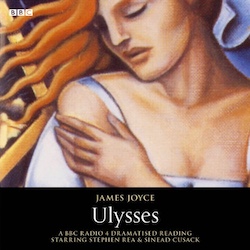
Ulysses (BBC Radio “Dramatized Reading”)
Read by Stephen Rea, Norman Rodway, Sinéad Cusack, et. al.
BBC, 1993
Abridged; 7 hours, 25 minutes
Originally released on cassette in 1993, the BBC Ulysses is an extraordinary achievement, capturing the spirit of Joyce’s enormous text through a seven-hour abridgment. Advertised as a “dramatised reading,” the production relies on three main actors to read the chapters of Ulysses most associated with their characters. As Joyce’s narrative becomes more complex, the production expands to include sound cues and multiple streams of dialogue. This comes to a head in the “Circe” episode, where the “reading” explodes into a fully-realized radio play with extras, sound effects, and music. As the stage begins to narrow again, we’re toppled into Molly’s dreamy thoughts, her soliloquy refocusing the narrative to a solitary voice.
The “Stephen chapters” are read by Irish actor Stephen Rea, familiar from The Crying Game, Hedda Gabler, Interview with the Vampire, and Sean Walsh’s Ulysses. Rea brings Stephen’s pensive nature to the foreground, but never loses the self-deprecating humor that makes his brooding temperament so fascinating. The Bloom chapters are read by Anglo-Irish actor Norman Rodway (1929-2001), who once portrayed Stephen Dedalus in a Joyce-inspired stage play, Stephen D. His characterization is a study of Bloom’s most humane traits, from his sense of compassion to his genial awkwardness. Molly is portrayed by Sinéad Cusack, the daughter of Cyril Cusack, the voice behind Caedmon’s classic mid-century Joyce recordings. An intoxicating blend of earthy sensuality and dreamy nostalgia, her soliloquy is one of the best versions recorded—the final few moments are pure witchcraft.
A marvelous production, from the clarity of its sound to its brazenly erotic cover. Highly recommended!
Ulysses
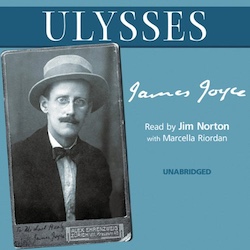
Ulysses
Read by Jim Norton & Marcella Riordan
Naxos, 1994/2004
Also available as: CD
Also available as: Abridged Version
Unabridged; 27 hours, 16 minutes
In 1994, Naxos published a 4-CD abridged version of Ulysses read by Irish actors Jim Norton and Marcella Riordan. The production was directed by Roger Marsh, who also selected musical cues based on the text. Ten years later, Naxos released the entire unabridged reading as a handsome 22-CD box set with an introduction by Joyce scholar Derek Attridge. The set was reviewed by Brazen Head editor Bob Williams.
Bob Williams: If a man in the Middle Ages read silently, others might have suspected him of being a magician. The accepted way to read was to read aloud. A monk read to his fellows at meals and a reader delivered the text to scribes. Up to fairly recent times, a reader could amuse workers busy with dull, repetitive labor. To Jane Austen, a good reader was second only to a good actor, and had much the same responsibilities to the audience. Family readings were once a common entertainment, and most of us have fond memories of being read to at home and at school both before and after we learned to read. But today, for most adults the pleasures of listening to another read has faded. It survives as the solace of the commuter or the worker who confronts mindless toil. To sit, therefore, in one’s home surrounded with its urgent demands and to listen to a recording of a book seems at best unnatural. But, although initially it seems an uncomfortable and a strange task, there are for the persistent persuasive compensations.
When we read, the inner voice in our head is usually our own. When we listen to another read, we are provided with a fresh voice; that inner voice to which habit has hardened us gives way to a voice that makes us face evaded challenges. It is harder for the mind to wander when the voice is new and skillfully used. If the book is a familiar one, listening is better than reading at renewing the text.
This new box set is essentially an extension of Naxos’ earlier abrdiged Ulysses, and it retains the former’s excellent sound quality as well as its helpful musical cues. A glance at the abridged version shows that in comparison with the complete recording, the latter is less generous with abrupt dynamic ranges. It is, in other words, suitably designed for the long haul. It is a smoother listening experience.
Readers of Ulysses will recall the overall structure. The first nine chapters are relatively short and not—with the exception of the chapters known as “Proteus” and “Scylla and Charybdis”–specially difficult to understand. The use of the recording rather than the book was not of much advantage—one way was as easy as the other, with listening perhaps being slightly more burdensome. But with the introduction of the first of the revolutionary chapters—“The Wandering Rocks”—the recorded version showed a great advance over the book. The skill of the reader, Jim Norton, has much to do with this. Questions of understanding being cleared away, one is able to concentrate on the text with attention on essentials that a reader can seldom accomplish easily. The chapter known as “Sirens” especially benefited from this, since Norton’s reading was versatile, sensitive, and alive in a sustained effort that excites admiration.
These same passages that Norton reads so brilliantly are exactly those to which Joyce—hag-ridden by compulsions to consistency and exhaustive (and often exhausting) completeness—contributed longueurs, and little can be done to soften these. They are not so many or so prolonged as some critics—many of them not completely familiar with Ulysses—claim, but they are there. The very long “Circe” chapter contains many of them but, as with similar situations of this type in Joyce, it also contains much that is funny and ingenious.
In this reading as well as other Naxos recordings, I have already commented sufficiently on the heroic and awesome versatility of Norton; but Marcella Riordan deserves equal praise. She reads the part of Molly wherever the intrusion of a second voice would not unduly disturb the listener. This limits her appearance to “Calypso,” the early scene in “Circe” (but not in the scene towards the end where she would have only one speech), and “Penelope.” The last was the only chapter where I found following along with the book to be an advantage. In keeping with the nature of Molly’s nighttime soliloquy, Riordan speaks softly and, while dramatically correct, it make no concession to the many possible environments the listener may be experiencing.
The last disc doubles as a CD-ROM, and contains a wealth of material on Ulysses, Joyce, and the recording itself. I found the comments of Norton and Riordan to be enlightening and well expressed. The disc includes over a dozen MP3s of Ulysses-related music, as well as the famous recording of Joyce reading from the “Aeolus” chapter. (Certainly a precious relic, but scratchy and distant, unlike his reading from Finnegans Wake.) Other items of interest include the Ulysses schema, an extensive reading list, notes on cinematic adaptations, and a useful essay by Joycean critic Derek Attridge. Although links to further essays are provided, many of them are available only to libraries through a criminal restriction known as the Muse Project. As Mrs. Breen said in another context “Great shame to them whoever they are!” (Completeness commands me to state that the disc includes a “Chronology of the Life of James Joyce” written by me. Modesty forbids me to say more.)
This is a great performance, one that Joyce himself would surely have seen as an interesting alternative. And like any great performance it is also a great experience, one that extends both over many days and indelibly over much of one’s consciousness.
Ulysses
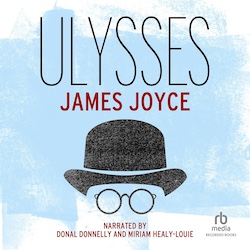
Ulysses
Read by Donal Donnelly & Miriam Healy-Louie
Recorded Books, 1995
Unabridged; 42 hours, 19 minutes
Recorded Books was founded in 1978 by Henry Trentman, a salesman who grew weary of listening to single-cassette abridged books on his car stereo. Devoted to the production of massive, unabridged sets which consumers could rent instead of purchase, Recorded Books grew from a small Maryland company to a million-dollar concern, gobbling up numerous competitors such as HighBridge Audio (Garrison Keillor’s old home) and Tantor Media. Recorded in 1995 with the authorization of the James Joyce estate, Ulysses features the Irish actor Donal Donnelly (1931-2010), celebrated for his work with the playwright Brian Friel. He also starred as Freddy Malins in John Huston’s The Dead. The “Penelope” episode is read by Galway actress Miriam Healy-Louie, a Shakespearean actress who played Rose Mundy in Dancing at Lughnasa. Visitor Kyle Engen kindly submitted the following review:
Kyle Engen: My hopes were high for this production, and I was not disappointed. This is the real thing, complete and compelling. Donal Donelly (who has also read Dubliners and Portrait) gives a thorough and beautiful reading. The pace is slow and while this seemed unnecessary during some of the more opaque passages, it was a blessing when things get strange (i.e. Stephen’s beach walk during the “Proteus” episode, or the trip to Nighttown in “Circe.”) The reading “Penelope” by Miriam Healy-Louie was captivating. Her charming voice and flawless interpretation kept me riveted. At times I remained in my car listening for several minutes because I didn’t want to leave her. The text used for this recording is the Gabler corrected version, but I detected none of the comma controversy. I am not that close to the earlier edition, though there were a couple of passages in the “Nestor” chapter where I felt lines were misread. [Editor: According to visitor Alex McAlmon, “apparently they did a fair amount of research before recording the book: compiling pronunciation guides, etc.”]
Ulysses
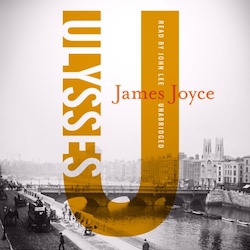
Ulysses
Read by John Lee
Blackstone, 2010
Also available as:
Unabridged; 29 hours, 57 minutes
Blackstone Audio was founded in 1987 as “Classics on Tape.” Their unabridged Ulysses is narrated by John Rafter Lee, an English voice actor and playwright with Irish heritage. Named a “Golden Voice” actor by AudioFile, the magazine editors remarked, “his trademark rich, smooth voice with a hint of a growl turns the word into a seduction.” Like all his Joyce audiobooks, Lee’s Ulysses is uniformly excellent, delivered with a believable Irish accent and employing a wide range of actorly voices. Highly recommended.
Ulysses (2012 BBC Radio Drama)

Ulysses (BBC Radio Drama)
Read by Andrew Scott, Frances Barber, Henry Goodman, Jim Norton, Niamh Cusack, Stephen Rea
BBC Digital Audio, 2019
Also available as a bundle: James Joyce BBC Radio Drama Collection
Also available as: Internet Archive MP3
Abridged; 5 hours, 24 minutes
On Bloomsday 2012, BBC-4 broadcast a dramatized reading of Ulysses featuring an all-star cast and narrated by Stephen Rea, who portrayed Stephen Dedalus in their 1993 dramatization. A more fully-realized production than this early iteration, the 2012 BBC Ulysses is a proper radio play, with dozens of actors, frequent musical queues, and a wealth of clever sound effects. The actors are generally first-rate, from the Joycean stalwart Stephen Rea to Joycean newcomer Andrew Scott, whose portrayal of Stephen demands a dedicated audiobook of Portrait—after all, he’s already done Dubliners, so why not? While Henry Goodman’s accent has been criticized by no less a source than The Guardian, his sensitive Bloom is entirely sympathetic. And there’s a few surprises for Joycean trainspotters as well: Molly is played by Niamh Cusack, daughter of famed Caedmon narrator Cyril Cusack and sister of Sinéad Cusack, who played Molly in the 1993 production; and Naxos’ favorite Joycean Jim Norton flips the script by playing the shoneen Mr. Deasy. And while we’re on the subject, Cusack’s Molly is probably the sexiest Molly committed to record—her flirtatious manner charges her remembrances with an erotic playfulness that brings Joyce’s dirty love letters to mind. There’s no doubt she’d roll up a letter and…uh, just read the letters yourself.
Highly recommended, whether purchased as part of the BBC James Joyce collection or downloaded from the Internet Archive!
Ulysses
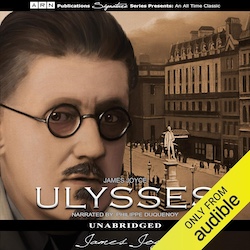
Ulysses
Read by Philippe Duquenoy
A.R.N. Publications, 2016
Also available as:
Unabridged; 29 hours, 15 minutes
Available from A.R.N. Publications—who have zero Web presence—this audiobook features British voice actor Philippe Duquenoy, who seems in a hurry to get through the reading. Not recommended.
Ulysses
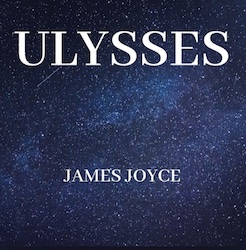
Tadhg Hynes & Kayleigh Payne set [Spotify]
Read by Tadhg Hynes & Kayleigh Payne
Victorian Classics, 2017
Unabridged; 31 hours, 40 minutes
Tadgh Hynes is an Irish narrator who specializes in Victorian fiction, and his readings of Joyce are among my personal favorites. Hynes has a wonderful Dublin accent, and he brings out all the nuances in Joyce’s text—the humor and warmth, confusion and doubt, wonder and irony, aloofness and pretension. His dialogues in Ulysses are especially engaging, particularly the rapid-fire repartee between Joyce’s salty Dubliners. His Stephen is pensive but not overbearing; while his Bloom is simply delightful—even Bloom’s cat is brought to life with good cheer. Kayleigh Payne’s Molly is also excellent—while not quite as gripping as the Cusack sisters, her “Penelope” is riveting, illuminated by sing-song verse. Interestingly, the production does not end with Molly’s “yes,” but Payne’s lilting rendition of “Love’s Old Sweet Song.” It’s an interesting decision, but one wishes the producers had added a few seconds of silence between the novel’s magical conclusion and the song.
Note: As of June 2024, this set is not longer available through Audible/Amazon! Fortunately, you can still hear it on Spotify.
Publisher’s Description: Narrator Tadhg Hynes: “I first decided to record Ulysses in October 2015. Little did I know then what an unforgettable 18 months lay ahead. Having already recorded Dubliners and Portrait (and being terrified of Ulysses), I decided to give myself a year just to read it. However, after about four episodes I started recording it and became hooked. Being a Dubliner and having the privilege of walking the pages of this book daily, it became a world that absorbed me totally. Almost everywhere I went in Dublin, Joyce was there. I kept coming across phrases from the book in real life. I was born in Holles St. Hospital some 60 years after the Oxen of the Sun episode was set there. While the city has moved with the times, it’s still unavoidable to get the sense of Joyce’s Dublin even now. Some parts of the book are more difficult than others, but I found that every word had its place, and with a bit of effort and research it came to life. Don’t be put off by its reputation. You don’t need a university degree (though some like to think that you do!). It’s a book for everyone, and as you become familiar with the way Joyce writes, this becomes obvious. I’ve tried to bring out the Dublin wit and the unique language of its people, and I hope that this adds to the enjoyment of this great book. I would like to add a special note of thanks and admiration to the wonderful reading of Molly Bloom’s soliloquy, given by Kayleigh Payne. Famed for its lack of punctuation and rambling nature, this iconic piece of writing is beautifully interpreted and sensitively portrayed. Kayleigh’s work has brought a new dimension to the recording, and I am eternally grateful.”
Ulysses
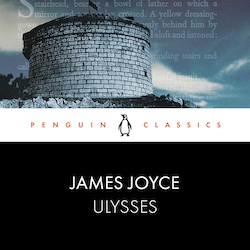
Ulysses
Read by Patrick Gibson
Penguin, 2019
Also available as:
Unabridged; 32 hours, 38 minutes
For their first unabridged Ulysses on audiobook, Penguin made an interesting choice—the young Irish actor Patrick Gibson, most familiar from his television roles in The OA, The Tudors, Before We Die, and Shadow and Bone. In his early twenties when the reading was commissioned, Gibson has a pleasant and surprisingly husky voice, but his narration feels more “young” than “youthful.” While this isn’t quite a “Y.A. Ulysses,” there’s a lack of gravity and nuance that’s especially noticeable during the Bloom episodes. Gibson struggles to establish distinct characterizations, and sometimes his tone feels at odds with Joyce’s narrative cues.
Ulysses
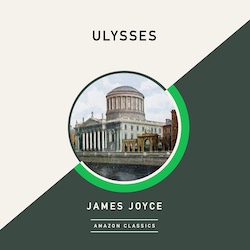
Ulysses
Read by Aidan Kelly & Alana Kerr Collins
Brilliance Audio, 2020
Also available as:
Unabridged; 31 hours, 10 minutes
Founded in Michigan in 1984, Brilliance Audio was acquired by Amazon in 2007. This unabridged Ulysses features Irish actor Aidan Kelly and Belfast-born actress Alana Kerr Collins. Kelly has a rich Dublin accent, and enjoys investing his characters with bold personalities. Collins is less dramatic—more a “reader” than an “actor”—but her voice has a wonderful precision.
Ulysses
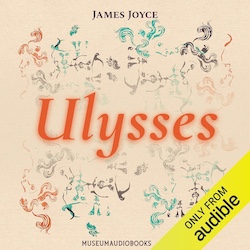
Ulysses
Read by Stewart Crank
Museum Audiobooks, 2020
Also available as a bundle: The Ultimate James Joyce Collection
Unabridged; 36 hours, 16 minutes
Read by British voice actor Stewart Crank, Ulysses is part of a larger “Ultimate James Joyce Collection” issued by Museum Audio Books, which includes Crank reading Dubliners and Portrait as well. Crank has a pleasant English accent, and his delivery has the flair of a storyteller—nothing is overdone, and everything feels lucid and distinct, with just the right amount of “acting.” However, rather than purchase Crank’s Ulysses, visitors are recommended to purchase the Ultimate James Joyce Collection—which only costs 1 credit, the same as Ulysses alone!
James Joyce Collection
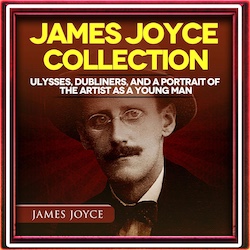
James Joyce Collection
Read by Rory Young
Montgomery Providence Publishing, 2021
Unabridged; 43 hours, 2 minutes
This collection is read by Canadian voice actor Rory Young, and is listed here because Young’s reading of Ulysses is not available as a separate edition. His narration is pleasant enough, but his neutral, North American accent and lackluster delivery are more suited to a corporate video than Joyce’s multivalent prose. If you’re in the mood for a Joyce bundle, the Stewart Crank collection is a better option.
Friends of Shakespeare and Company Read Ulysses by James Joyce
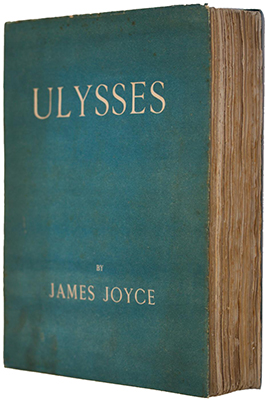
Friends of Shakespeare and Company Read “Ulysses” by James Joyce
Read by Sally Rooney, Margaret Atwood, Stephen Fry, Pete Buttigieg, et. al.
Shakespeare and Company, 2022
Unabridged
A Bloomsday project “conceived and produced” by Adam Biles, the Literary Director of Shakespeare and Company, this free podcast assembles a massive cast for an episode-by-episode reading of Ulysses. I have not heard the production yet, and would welcome any comments!
Publisher’s Description: To celebrate a hundred years since Sylvia Beach published James Joyce’s Ulysses, and to encourage readers to engage (or re-engage) with this spirited, funny, life-changing book, Shakespeare and Company, Paris—in partnership with Penguin Classics and Hay Festival—created an ensemble recording of the unabridged text, released as a free podcast between the centenary of the publication on 2nd February 2022 and Bloomsday on June 16 2022. Read by more than a hundred writers, artists, comedians and musicians from all over the world—including Sally Rooney, Margaret Atwood, Stephen Fry, Pete Buttigieg, Kae Tempest, Ben Okri, Ali Smith, Eddie Izzard, Joanna Lumley and many, many more, Friends of Shakespeare and Company read Ulysses is a polyphonic and diverse celebration of this Modernist masterwork.
Joyce Audio
[Main Page | His Own Voice | Collections | Dubliners | Portrait | Ulysses | Finnegans Wake | Drama & Poetry | Biography & Criticism | Miscellany]
Author: Allen B. Ruch
Last Modified: 28 August 2024
Main Joyce Page: The Brazen Head
Contact: quail(at)shipwrecklibrary(dot)com


